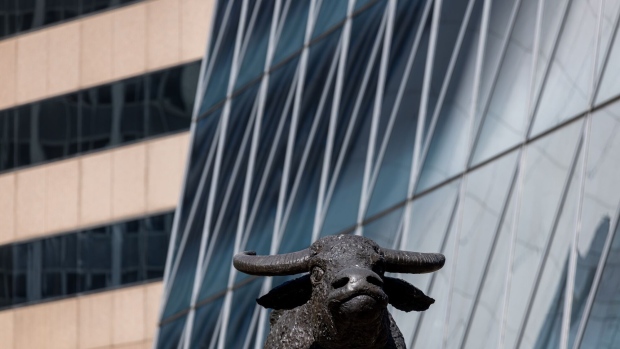Apr 28, 2024
Hong Kong’s Hang Seng Index Jumps 20% From January Low, Heads for Bull Market
, Bloomberg News

(Bloomberg) -- Hong Kong stocks gave up the bulk of their early advance on Monday, suggesting that caution may be returning to the market after the benchmark index marched to the brink of a bull market.
The Hang Seng Index finished the session up 0.5%, capping a sixth straight day of gains, after jumping as much as 2.2% earlier. The intraday move took the gauge’s rally to more than 20% from a January low.
“I suspect it is likely due to profit-taking after consecutive sessions of daily positive gains,” said Kelvin Wong, a market analyst at Oanda Asia Pacific Pte. Traders may also have pulled back ahead of the release of China’s factory data Tuesday, he added.
The latest rebound in Hong Kong stocks has turned them into some of the best performers globally this month, with one money manager saying cautious optimism is helping to drive the turnaround after years of losses. Yet the quick paring on Monday suggests investors are still seeking evidence of policy support to continue buying stocks, with an expected Politburo meeting this week likely a key barometer.
The rally has already driven other indexes in China and Hong Kong to technical bull markets in recent weeks. What started out as strong inflows from the mainland as well as a rotation by global funds into relatively cheap Chinese internet stock is now starting to show signs of exuberance.
Shares of the nation’s beleaguered property developers stood out on Monday, surging amid bets for more policy support at the widely-expected meeting of China’s top leadership body later this week. Even companies in default surged, with Shimao Group Holdings Ltd. jumping 61%.
A Bloomberg Intelligence gauge of builders’ shares jumped almost 12%, the most since November 2022, with sentiment aided after a major developer said it reached a restructuring agreement with bondholders. News that a major city was easing home purchase restrictions also drove expectations of more relaxation.
“People are getting excited over a potential shift in policy mindset toward the property sector,” amid talk that Beijing will focus on driving demand, with the government buying up unfinished projects, said Zhang Hao, chief investment officer at Granford (Beijing) Capital Management Co. “The rally in Hong Kong today is really driven by these hopes and it could have more legs as valuations have been depressed for such a long time.”
Casino stocks also rallied as China relaxed passport and travel rules, including to Macau where the operators are located.
FOMO Effect
The rally is drawing out a fear of missing out, according to strategists at Goldman Sachs Group Inc., as key gauges last week posted their best gains in years. UBS Global Wealth Management says the rally has room to run as it’s driven by earnings and cheap valuations, while others are betting that authorities will add to the measures aimed at reviving the economy and markets.
“It is so cheap, nobody is positioned, and they have to come back,” Adrian Zuercher, head of global asset allocation and co-head of global investment management for the Asia-Pacific region at UBS Global’s office in Hong Kong, said in a Bloomberg TV interview. “I think this rally can last a bit longer.”
Cheap valuations for Hong Kong stocks, which had declined for four consecutive years, are providing a haven of sorts as investors reprice the impact of higher US rates for longer. Hedge funds are helping to drive the gains, according to a report by China International Capital Corp.
Read more: Fed Repricing Gives Rise to New Equities Playbook in Asia
The HSI and the Hang Seng China Enterprises Index have each jumped more than 7% in April to rank among the best performers in a group of more than 90 global equity gauges tracked by Bloomberg. Mainland traders have bought Hong Kong stocks via the southbound trading links for 21 straight sessions, according to data compiled by Bloomberg. Turnover in Hong Kong jumped to the highest since July on Friday.
Others are more cautious given lingering risks from geopolitical tensions and doubts over the sustainability of the economic rebound. During the weekend, China said industrial companies’ profits fell in March as exports flagged and deflationary pressures persisted.
“The gains today are driven by wagers on policies, and these tend to be risky because it’s always a case of buy on rumor sell on fact and even if these policies materialize, there is always the question of how much it will actually drive up demand,” said Niu Chunbao, fund manager at Shanghai Wanji Asset Management. “That’s why I am still relatively cautious on the broader outlook. The outlook for the economy has not changed that much.”
--With assistance from John Cheng, Sangmi Cha and Abhishek Vishnoi.
©2024 Bloomberg L.P.






